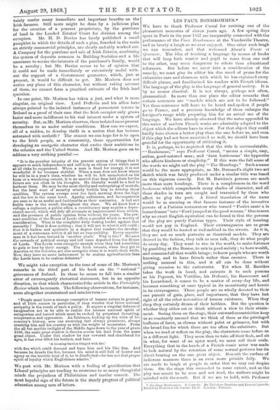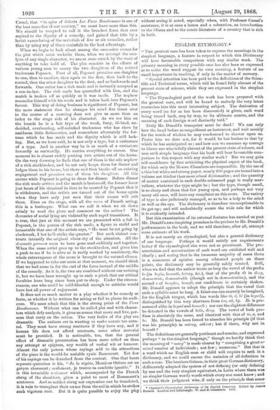LES FAUX BONSHOMMES.* WE have to thank Professor Cassal for
reviving one of the pleasantest memories of eleven years ago. A few spring days
spent in Paris in the year 1857 are inseparably connected with the
performance of the Faux Bonshommes at the Vaudeville Theatre, and as hearty a laugh as we ever enjoyed. One other such laugh we can remember, and that welcomed About's Trente et Qnarante. The idea of teaching a language by means of books that will keep both master and pupil in roars from one end
to the other, may seem dangerous to others than educational reformers. But before we enter into a consideration of the comedy, we must give its editor his due meed of praise for the exhaustive care and clearness with which he has explained every difficult phrase, and familiarized his readers with French idioms. The language of the play is the language of general society. It is by no means classical. It is not always, perhaps not often, grammatical. In more than one place the editor remarks that certain sentences are "models which are not to be followed." Yet these sentences will have to be heard and spoken if people go to France, and a previous knowledge of them enlarges the foreigner's range while preparing him for an actual use of the language. We have already observed that the notes appended to this series of modern French works are admirably adapted to the object which the editors have in view. For that object they could hardly have chosen a better play than the one before us, and even if this play had not been annotated so well, we should have been grateful for the opportunity of criticizing it.
It is, perhaps, to ba regrettad that the title is untranslatable. " Bouhomme,' " says Professor Cassal, "means a simple, easy, artless, good-natured man ; and faux bonhomme' the hypocrite who affects kindness or simplicity." If this were the full sense of the words we might call the play "Time Humbugs." Such a name would be the more appropriate, as Mr. Burnand's slight two-act sketch which was lately produced under a similar title was based on this vigorous comedy. But M. Barriere's persons are much more than mere humbugs. There is a completeness in the word bonhomie which comprehends many shades of character, and all these shades in turn are caught and travestied by those who affect to play the part. A literal translation of the name would be as amusing as that famous instance of the inventive powers of a Parisian restaurateur who turned " Poulet sautti h la bonne femme" into "Fowl jumped at the good woman." One reason why no exact English equivalent can be found is that the persons of the play are purely Parisian types. Their style of humbug would not pay in England. Their extravagances are so gross that they would be hooted at and mobbed in the streets. As it is, they are not so much portraits as theatrical models. They are dressed in the fashion, they talk as men talk, they do what people do every day. They want to rise in the world, to make fortunes by gambling at the Bourse, to mix in good society ; to have wealth, and command all that wealth brings ; to know people who are worth knowing, and to have friends rather than enemies. There is nothing unusual in this, and it all can be done without giving occasion to the caricaturist. Yet when M. Barriers takes the work in hand, and entrusts it to such persons as his Peponet, his Vertillac, his Dufoure, his Bassecourt and his Lecardonel, it ceases to be a matter of every-day life, and becomes something at once typical in its monstrosity and heroic in its extravagance. These people are so wholly devoted to their one pursuit of gain, place, and importance, that they have lost sight of all the other necessities of human existence. When they sleep they certainly dream of their hobbies. But the question is whether they either eat or drink without a view to their attain- ment. Seeing them on the stage, their outward eccentricities keep us so constantly amused that we think of them as the privileged buffoons of farce, as clowns without paint or grimaces, but with the broad fun for which these are too often the substitute. But when we read or reflect on the play, the characters come before us in a different light. They seem then to take off their flesh, and sit in what, for want of an apter word, we must call their souls. Everything that in the hands of a French comic actor was made to look natural by the retention of some normal gestures has its direct bearing on the one great object. Beneath the surface of ludicrous manners there is an oven more pitiable folly. We are made to laugh at people in order that we may not despise them. On the stage this succeeded to some extent, and as the play was meant to be seen and not read, the authors might be satisfied with the result. But if we are to hold, with Professor • Les Faux Bonshommes, A Comedy. By Thdodore Barrihre and Ernest Capenda. Edited by Professor Ch. Casual, LLD. London: TrUbner. Cassel, that "iii spite of defects Les Faux Bonshommes is one of the best comedies of our century," we must have more than this.
We should be tempted to call it the broadest farce that ever aspired to the dignity of a comedy, and gained that title by a lavish squandering of the materials of five or six comedies, rather than by using any of thoze materials to the best advantage.
When we begin to look about among the successive scenes for the plot which must underlie them, when we attempt the ana- lysis of any single character, we are at once struck by the want of anything to take hold of. The plot consists in the efforts of various young men to marry the two daughters of the retired tradesman Peponet. First of all, Peponet promises one daughter to one, then to another, then again to the first, then back to the second, then the other daughter to the first, and so backwards and forwards. One suitor has a rich uncle and is instantly accepted as a son-in-law. The rich uncle has quarrelled with him, and the match is broken off as quickly as it was made. The nephew reconciles himself with his uncle and is taken back into Pepouet's favour. This way of doing business is significant of Peponet, but the mere statement that he changes his mind five times over in the course of a morning does not give us more than an index to the stage side of his character. As we see him on the boards he is a fair type of the weak, fussy, ill-bred, un- decided, overbearing, self-satisfied tradesman who has risen by assiduous little dishonesties, and remembers alternately the for- tune which he has made and the dignity which is still lack- ing. But, as we have said, he is not only a type, but a caricature of a type. And in another way lie is as much of a caricature inwardly as outwardly. Ile carries everything to excess. One moment he is almost rudely pushing two artists out of the house. On the very doorstep he finds that one of them is the sole nephew of a rich stockbroker, and he not only keeps them for dinner and lodges them in his house, but there and then breaks off an existing engagement and promises 0113 of them his daughter. All this occurs while Peponet is going to dress for dinner. Before dinner the rich uncle arrives and the match is broken off, the former lover just hears of his dismissal in time to be assured by Peponet that it is withdrawn, and the artists are turned out of the house again
when they have only just seen that their rooms will suit them. Even on the stage, with all the verve of French acting,
this is a burlesque. What can we call it when we sit down calmly to read the piece and comment on the action ? The decencies of social lying are violated by such rapid transitions. It
is true, that just at this moment we are presented with a foil to
Peponet, in the person of the rich uncle, a figure so stolid and immovable that one of the artists says, "He must be set going by clockwork, I bet he'll strike the quarter." But such violent con-
trasts intensify the original absureity of the situation. All the dramatis persona seem to have gone mad suddenly and together.
When the same artist goes up to the stockbroker, and gives him a push to see if he is alive or is really worked by machinery, the whole extravagance of the scene is brought to the natural climax.
If we happened to take our seats at that moment, we should think that we had come in for the end of the farce instead of the middle of the comedy. As it is, the two are combined without our noticing it, but we have been wrought up to such a pitch that our critical faculties have long since been put to sleep. Under the circum- stances, one who could be cold-blooded enough to criticize would have lost all power of enjoyment.
It does not so much matter to a play whether it be comedy or farce, as whether it be written for acting or fail to please its audi-
ence. We must admit that this is the strong point of the Faux Bonshommes. Without what can be called plot and with charac- ters which defy analysis, it gives us scenes that move and live, per-
sons that carry on the action. The very faults of the play are dramatic. The authors err in wanting to make nature too natu- ral. They must have strong contrasts if they have any, and if human life does not afford contrasts, some other material must be provided. It is noticeable, too, that the general effect of dramatic presentation has been more relied on than any attempt at epigram, any wealth of verbal wit or humour.
Almost the only person whose sayings add to the attractions of the piece is the would-be amiable cynic Bassecourt. Yet few of his sayings can be detached from the context. One that bears separate quotation is his, " Je he r6pete, Monsieur Octave eat un garcon charmant ; seulement, je trouve sa conduite ignoble." It
is this invariable sculement which, accompanied by the French shrug of the shoulders, gives a point to most of Bassecourt's sentences. And as neither shrug nor expression can be translated, it is vain to transplant their owner from the soil in which lie strikes such vigorous root. Bat it is quite possible to enjoy the plaY
without seeing it acted, especially when, with Professor Cassal'e assistance, it is at once a lesson and a relaxation, an introduction to the idioms and to the comic literature of a country that is rich in both.































 Previous page
Previous page